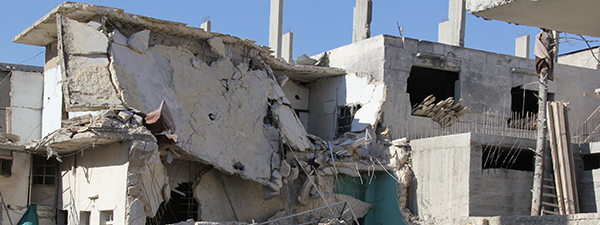
++We are in the process of updating this page to reflect our brand new report, out May 15, 2019++
The Syrian crisis is the worst humanitarian disaster of our time. During more than seven years of conflict, the Syrian government and its Russian allies have conducted a strategy of war on civilians and civilian infrastructure that has included targeted attacks on health care facilities and personnel. They have blocked access to water, food, and health services through sieges. The country’s once sophisticated health system has been decimated. Other parties to the conflict have also attacked health facilities and persecuted health care workers.
The conflict in Syria began with peaceful protests for human rights and democracy in 2011. Since then, it has spiraled into a brutal conflagration involving numerous parties: the Syrian government and its allies, anti-government armed groups, and ISIL, which a U.S.-led international coalition has targeted. Though all parties in the conflict have perpetrated attacks on health care, the Syrian government and its allies are responsible for the vast majority of these attacks.
Our annual report, released in May 2018, stated that at least 470,000 people had died during the conflict, more than half of the country’s 22 million people had been displaced, and 13.1 million people were in need of humanitarian assistance. Despite the unanimous adoption of Resolution 2286 by the United Nations Security Council in May of 2016, the worst atrocities against civilians and health care have continued to be perpetrated with total impunity.
Two member organizations of the coalition focus specifically on Syria. The Syrian American Medical Society (SAMS) supports health care and health professionals working under fire in many locations in Syria and advocates for action by the international community to end attacks on health care and to allow unhindered humanitarian access to besieged areas. Physicians for Human Rights (PHR) tracks and reports on the continued attacks on health facilities and personnel via its online map, and advocates for cessation of and accountability for these war crimes. As of December 2017, PHR had documented 492 attacks on 330 medical facilities throughout the duration of the conflict, and had recorded the deaths of 847 health care workers, which it notes is just a minimum number of what is certainly a much larger toll.
Despite the already shocking level of destruction, injuries, and deaths and the adoption of Resolution 2286, the situation in Syria continues to escalate and has reached catastrophic levels. SAMS estimates that, in 2017 alone, 41 health care facilities were forced to close permanently or temporarily due to attacks. In these attacks, 24 medical personnel were killed and 55 were injured, along with 146 civilians who were either killed or injured. At least 2.98 million Syrians were living in hard-to-reach or besieged areas, where aid convoys were often stripped of vital supplies such as medical and food aid, resulting in malnutrition, starvation, and preventable deaths of civilians. Continued attacks on aid convoys have limited the delivery of much-needed humanitarian relief to thousands of Syrians, and medical personnel were faced with an ever-decreasing supply of medicine and equipment. In eastern Ghouta, there have been reported outbreaks of measles, typhoid fever, tuberculous, and salmonella, which cannot be effectively treated due to lack of medical supplies. These outbreaks are magnified by the continued use of contaminated water.
Attacks have occurred throughout the country, but most frequently in areas under opposition control where the Syrian Armed Forces and their allies continued to target civilians and infrastructure. Eastern Ghouta, northern Hama, and southern Idlib were particularly affected in 2017, with 31 of the 38 attacks, or roughly 81 percent, occurring in these regions. PHR also confirmed incidents in Aleppo, Damascus city, Deir Ezzor, and Homs.
What can we do?
You can join the Safeguarding Health in Conflict Coalition and its members that focus on Syria – SAMS and PHR – in our advocacy for the protection of health care and the implementation of Resolution 2286 by sharing the following recommendations to the UN and its member states:
- Call on the UN Security Council to demand that all parties to the conflict immediately end attacks on civilians, health care, and civilian infrastructure, and allow unhindered humanitarian access to besieged areas across Syria.
- Demand that all parties immediately comply with their obligations under international law, including international human rights law, as applicable, and international humanitarian law, to: protect civilians; ensure the respect and protection of all medical personnel and humanitarian personnel exclusively engaged in medical duties, their means of transport and equipment, as well as hospitals and other medical facilities; fully and immediately implement all provisions of all relevant Security Council resolutions.
- Call on UN Security Council member states to refer the case of Syria to the International Criminal Court.
- Call on the UN Secretary-General and UN General Assembly to continue to support the International Impartial Investigative Mechanism for Syria (IIIM) that the General Assembly established in 2017 as a preliminary accountability step to national, regional, and international accountability for the war crimes committed in Syria.
Photo courtesy of the Syrian American Medical Society (remains of a hospital in Aleppo)

